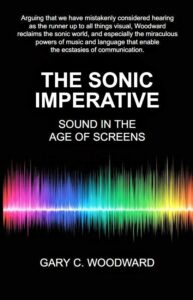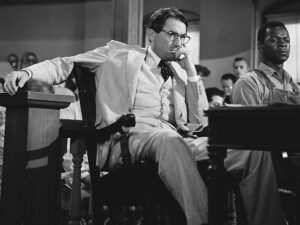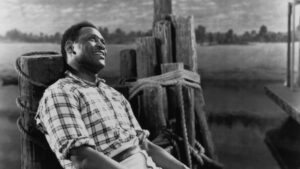It would have been fun to have been in the room when this natural garage tinkerer stumbled on to what has since become the standard of multi-track recording.
One of the pleasures of a writing project on how sound has been used and misused has been the discovery of some unlikely heroes who promoted key audio innovations. Here’s five.
 Bing, a Mic, and a Tape Recorder. In his day, Bing Crosby was a mega-star with hugely popular recordings and radio shows. In the 1930s his relaxed approach to singing in front of a microphone redefined what a public performance can be. In the older form of vaudeville, the energy of the performer did most of the ‘selling.’ In radio, the microphone made those over-the-top performances unnecessary.
Bing, a Mic, and a Tape Recorder. In his day, Bing Crosby was a mega-star with hugely popular recordings and radio shows. In the 1930s his relaxed approach to singing in front of a microphone redefined what a public performance can be. In the older form of vaudeville, the energy of the performer did most of the ‘selling.’ In radio, the microphone made those over-the-top performances unnecessary.
Crosby eventually grew tired of the time constraints of live radio. So it was natural to seek a way to make recordings of shows and re-edit some others. The problem was that, in this period, powerful radio executives thought it was unacceptable for their networks to foist recordings on an unsuspecting public. They expected their stars to show up in their living rooms in real time. Bing eventually broke the “no recorded programs” taboo, gaining more time to do other things in life, like playing golf. The solution came in the form of the Ampex Corporation’s development of tape recorders modeled on pioneering work done by the Germans during World War II. Tape was a far superior medium for recording than “cutting” records directly to heavy shellac masters. In addition, it was possible to easily edit the quarter-inch PVC tape to delete mistakes or add additional material. He liked tape so much he bought shares in the company and gave away recorders to friends. The networks eventually succumbed.
Les Paul and Mary Ford ‘invent’ Modern Recording
Guitarist Les Paul received one of Bing’s tape machines. At the time Paul was beginning to use a recently improved Gibson electric guitar: one of a new breed of solid-bodied instruments with two “pickups” that amplified the sound of the strings electronically rather than through the acoustic body. Because of a technical mistake he made while learning to use the recorder, Paul discovered that he could record sound over an existing track. It was then just a small additional step to record parts of one song on different tracks that played back together, often with a slight delay. It would have been fun to have been in the room at the time when this natural garage tinkerer stumbled on to what has since become standard in the industry: multi-track recording. We may no longer use tape for all recordings; computer audio files do more or less the same thing. But we still count on the ability to “build up” a recording in a studio from many separate tracks.
Adding rhythm and bass tracks in a multitrack recording of his own previously recorded melody line turned Les Paul into a one-man band, with no set of innovations coming together so clearly than in “How High the Moon,” released in 1951. Mary Ford’s slightly delayed voice melded with the multi-tracked guitar to produce a groundbreaking hit that wore out jukeboxes across the nation.
A Surprising Audio Pioneer. Anyone visiting the Sony Studios in Culver City will find what is perhaps the most honored room for recording music in the United States, the Barbra Streisand Scoring Stage. It is surely an honor to have her name associated with the space, which was the location where most of the spare-no-expense MGM scores of the 50s were recorded, not to mention music for more recent films as well. The largest session ever done on the historic stage used an 80-piece orchestra with a 100-person choir (Empire of the Sun).

The official reason for the honor was to give credit to the singer who regularly used the space to record sound tracks for Funny Girl and many of her 49 Gold Albums. There’s also a less official backstory as well. When Streisand was finishing her version of A Star is Born in 1976, she wanted to use the still-new Dolby surround format for the film. But that meant pushing for better playback equipment in theaters scheduled to show the release. Many of them were still barely able to reproduce stereo sound. Using her considerable clout, Streisand demanded that bigger theaters improve their audio systems.
 Please don’t cut me in two with that flashlight. One classic piece of Hollywood lore is how the fabled sound designer Ben Burtt created the iconic effects of “lightsabers” slashing through the air. The distinctly electronic noise from the Star Wars series is now burned into our cinematic memories. The sabers were the preferred weapons of the future, but also a throwback to the swashbuckler films of the 1930s and 40s. Every action film needed a master dualist who could slice his way to dominance against villains who were as unlikable as Lord Vader.
Please don’t cut me in two with that flashlight. One classic piece of Hollywood lore is how the fabled sound designer Ben Burtt created the iconic effects of “lightsabers” slashing through the air. The distinctly electronic noise from the Star Wars series is now burned into our cinematic memories. The sabers were the preferred weapons of the future, but also a throwback to the swashbuckler films of the 1930s and 40s. Every action film needed a master dualist who could slice his way to dominance against villains who were as unlikable as Lord Vader.
Burtt came up with a blend that included sounds of an old movie projector motor he remembered from his days at USC, in addition to a nasty interference hum discovered when his microphone got too close to an old television set. Back then, a household filled with radios and televisions was an endless source of spurious electric interference that could rival Victor Frankenstein’s laboratory. That intrusive hum picked up by the microphone gave off a noise of bleeding electrons not so different from what someone might hear standing near a high-voltage substation. But a lightsaber was not fixed in place. Its sound needed to change when it sliced through the air. Burtt found that if he took what he recorded from his two sources and played them back, he could then wave another mic around and near the speaker, creating a Doppler effect where the pitch slightly raises and lowers as the mic moved by. It’s indeed movie magic when a given sound turns a flashlight into an iconic movie weapon that has taken on a life of its own.
![]()
For more on recording and film sound see, available from Amazon.com and as an open-access file on this site.




